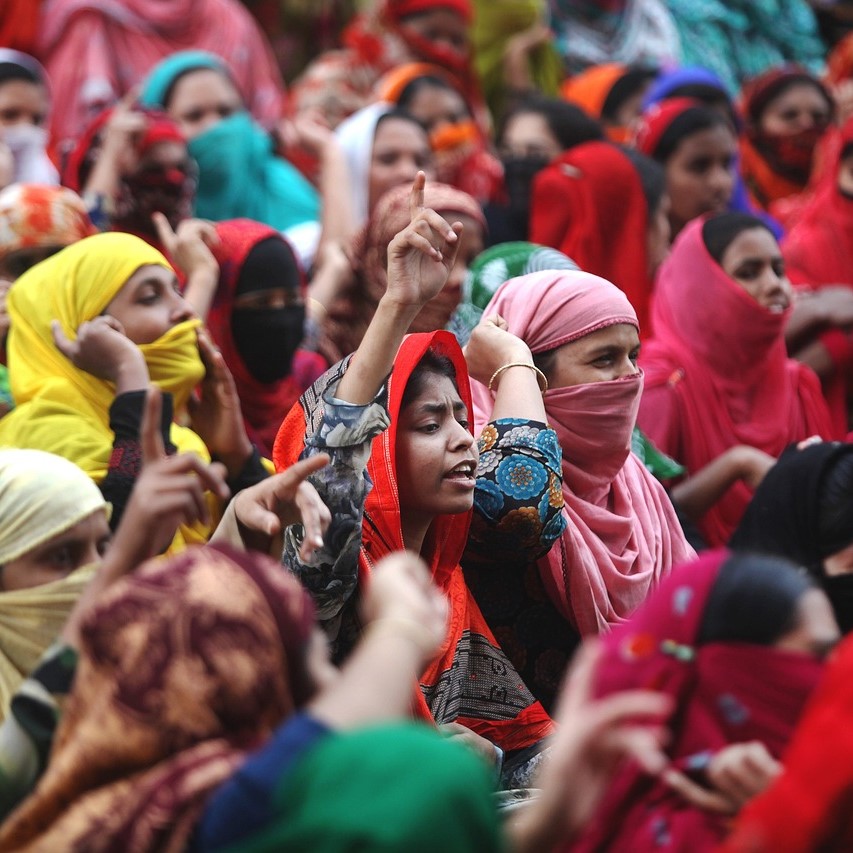In Bangladesh, textile workers are on the streets, demanding fair wages. The movement is repressed with force, and several demonstrators have already been killed, with thousands facing prosecution.
The fashion industry’s salaries, already low, have become absurd due to inflation, erasing the hard-won gains from past union fights, and workers face the never-ending task of renegotiating their rights.
A slight pay increase takes years of tough negotiations, but inflation can erase it overnight. This isn’t just Bangladesh’s issue; it’s a global problem.
The current minimum wage for garment workers in Bangladesh is 8,000 TK.
Trade unions are calling for at least 23,000 TK.
From the outside, it might seem like an unreasonably large increase: – how can people ask for 3 times their salary?
To understand what this means, we need to think about what a fair and decent wage would be. The Living Wage calculation based on the Anker methodology is an internationally recognized benchmark for defining a decent wage. The living wage is calculated locally based on the price of basic needs (food, housing, transport, healthcare, etc.). Earning a living wage isn’t a luxury; it covers just the minimum a family needs to avoid choosing between feeding the family, sending the children to school, taking the bus, or paying for medication for a family member.
Depending on the organization doing the calculation, the current living wage in Bangladesh is between 33,368 TK (Bangladesh Institute for Labour Studies) and 51,000 TK (Asia Floor Wage Alliance).
Even taking the lowest calculation, the conclusion is absolutely insane: workers currently earn 1/4 of a living wage! Can you imagine the kind of choices they have to make in their daily lives?
How can we call this anything other than modern slavery? Some will say that no one is forcing them to work in these factories, which makes the difference with past slavery, but what other choice do they have?
Who is responsible? Who’s to blame?
The answer is not so simple.
The factory owners? They would reply that they are complying with the law and that if they raise wages, they will no longer be competitive, will lose their customers, and the workers will lose their jobs.
The Bangladeshi government? It would say that if it raised the minimum wage, the country would no longer be attractive to international brands, and brands would move to the next cheaper country, as they always do. Millions of people would lose their jobs in Bangladesh.
The Fashion brands?
Some now say they will “agree to pay higher prices for clothes Made-in-Bangladesh to help the factories compensate for wage increases.” This is a rather hypocritical statement: if brands want to produce in a country where workers are better paid, why did they choose Bangladesh in the first place? Low wages and abundant labor are Bangladesh’s main competitive advantage. This isn’t the first time we’ve seen evidence that Bangladeshi workers are being exploited. There have been tragic incidents, such as the collapse of the Rana Plaza, and others and workers regularly go on strike to demand better conditions. Knowing this, they could have chosen to produce under more decent conditions. But they didn’t. Why? They would say that if they leave Bangladesh, the situation would be worse for the workers as they would lose their jobs.
They would also say that if they do not produce at such low costs and do not offer cheap products, they are not competitive, consumers won’t buy, and they will go bankrupt.
The consumers? They would say that they, too, are struggling financially, that their children are growing up fast and constantly need new shoes and clothes, that they can’t afford to pay more, and that they don’t have the time to look at where the clothes were made and anyway everything is made in Asia in similarly poor conditions.
The governments of the importing countries? They would answer that if they raise import barriers on Bangladeshi products, many people will lose their jobs in Bangladesh, that it will be unpopular with their electorate if they have to pay more for their clothes, and that they are under much pressure from the industry to favor their business (they probably wouldn’t say it though).
Who else could be blamed?
The system? This is undoubtedly a systemic problem. It may not be clear who is to blame, but it is very clear who is paying the consequences, working hard every day, and not even being able to feed their families properly.
The current strike will probably lead to a slight increase in the minimum wage. Today, the Bangladeshi government proposed raising the minimum wage to 12,500 TK. That’s still a long way from a living wage!
Of course, we have to think about the future generation and take care of the environment, but what sense does that make if we can’t take care of the current generation?
November 14th, 2023
Picture from AsiaNews
